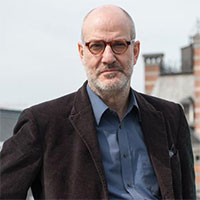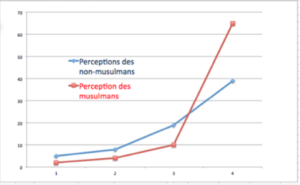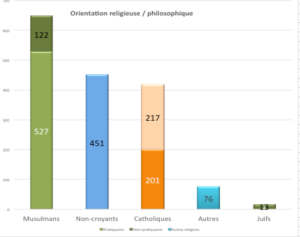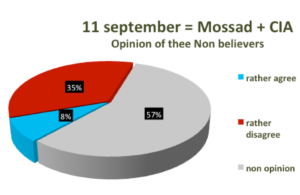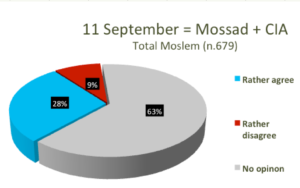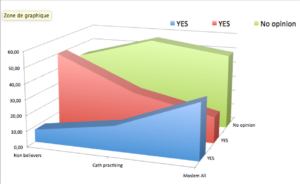Summary of a 70-page study on the representations of young people in Brussels, and the Other, including the Jew.[1]
In France, it is only fairly recently that the media, and the political and academic world, have come to accept the idea that the anti-Semitism of French people of Arab-Muslim immigrant origin is a real issue, especially for the maintenance of living together. It took the attack on Charlie Hebdo and the Hyper Casher for the political world, the judiciary, the press and the universities to finally accept to “see what we see”, to use Charles Péguy’s expression. Most alarm signals have long been ignored. Then, finally, quantitative surveys have largely confirmed the concern of a certain number of intellectuals who had been ignored until then. Without being totally clear-cut, this question is now being debated in France, which is still not the case in Belgium.
Belgium faced with the denial of anti-Semitism
In Belgium, no scientific study has been conducted on the question of anti-Semitism in schools. It is true that this question has been a blind spot in Belgium since 1945. The subject does not divide; it is simply ignored by the political, media and academic worlds. The massacre that struck the Jewish Museum in 2014 did not change anything; it did not provoke any particular awareness. However, politicians and journalists alike know that to-date, only specifically Jewish places – including nurseries, schools and youth movements – are subject to daily military surveillance, and that supposedly, Jewish students have been harassed.
The revolution Elchardus
The only notable exception is a study conducted by a sociologist from the Dutch-speaking Free University of Brussels (VUB), Mark Elchardus, in the context of a general survey of Flemish youth in Brussels, where he highlighted the reality of a very high prevalence of anti-Semitism among Muslim students[2]. On reading its findings, about half of them would present anti-Semitic opinions. It is to verify these results that researchers attached to the European Centre for the Study of the Shoah, Antisemitism and Genocide (CEESAG), a laboratory linked to the Institute for Jewish Studies near the ULB, have decided to conduct a “counter-investigation” in 2018-2019 on the theme of young people and the Other. The research sought to address the notions of antisemitism, homophobia and misogyny, this time in the French-speaking school network in Brussels. Our 70 pages present study is the result of this survey, which appears to be broadly representative of the opinion of French-speaking high school students in the Brussels region.
Out of the 115 French-speaking schools in the Brussels Capital Region, 60 schools were selected at random. Of these 60 schools, 38 agreed to meet with our investigators ((i.e., more than a third of all the French-speaking schools in Brussels, all networks (secular and Catholic), and branches (general, technical and professional) combined)). Of these 38 schools, 1,672 young people between the ages of 16 and 22, from all social, ethnic and religious backgrounds, were thus surveyed. In 75% of cases, the surveys were conducted by means of an electronic questionnaire in dedicated computer rooms, and the rest by means of a paper questionnaire. These young people responded to a multiple-choice questionnaire covering multiple topics in terms of representation and opinions but also knowledge and their religious affiliation. Our sample thus constitutes a representative demographic radiography of the French-speaking school population in the Brussels region. Our questionnaire was elaborated by a committee of experts under the supervision of sociologist Claude Javeau, professor emeritus of the French-speaking Université Libre de Bruxelles (ULB).
What does our data on young people in Brussels reveal?
Our survey thus provides lessons that are rather encouraging, alongside more worrying or contradictory aspects, particularly with regard to the death penalty in Europe. The fact remains that, overall, Belgian youth seems to be accustomed to the norms of cultural liberalism, according to the terminology defined by Gérard Grunberg and Etienne Schweisguth.
A globally tolerant youth
First observation: our survey reveals a French-speaking youth that is generally open and welcoming towards the Other. This does not mean that the youth are totally free of racist or sexist prejudices. Far from it. 14% of the respondents who declared themselves non-believers and 27% of the Catholic respondents do not envisage marrying a Muslim spouse. The same proportion of them did not envisage marrying a Christian spouse either.
While prejudice against both Arabs and Muslims is far from having disappeared, it appears to be contained and declining compared to adult generations. Our survey shows, in particular, that the terrorist attacks committed on Belgian soil have not led to a rejection of Islam as such. Only 2% of respondents link Islam and terrorism.
Islam is even, according to all of our respondents, the religion with the most positive image; Judaism, all confessions combined, the most negative. The same tolerance for the wearing of the full veil. It is indeed cultural liberalism that seems to characterize this generation: only 9% of practicing Catholics consider Christianity to be superior to other religions. According to all of our respondents, of all confessions, Muslims are the most persecuted minority, far ahead of Jews, atheists and Christians. Only 2% of non-Muslims agree with the idea that people, because they are Christians, can be persecuted because of their beliefs. Our survey paints the portrait of a generation sensitive to human rights and otherness.
Islam/Judaism/Christianity: the most persecuted religion?
In the eyes of our respondents, Muslims appear in any case as the first victims of discrimination. 39% of non-Muslims believe that Islam is the most persecuted religion, and this figure rises to 65% for the Muslim students surveyed. Next, comes Judaism, then Christianity, and finally atheism. However, nothing corroborates this feeling. On the contrary, statistics show that in Belgium as in France, since 2000, anti-Semitic acts are proportionally more frequent than anti-Muslim acts, even though Jews represent barely 0.23% of the Belgian population, and Muslims 6 to 7% (and more than 30% of the Brussels population). Moreover, the vast majority of complaints of “Islamophobia” relate to refusals to wear the veil, while acts of an anti-Semitic nature often take the form of physical attacks.
Islam: the most persecuted faith – Perception of Muslims and non-Muslims
FAITH: ‘Atheism’ Christianity Judaism Islam
Even non-Muslims list Islam as the most persecuted religion (39%). However, it is Christians from Africa to the Middle East, who are the object of major persecution today.
The weight of Islam
Our survey confirms Islam’s important weight in the Brussels region: 39% of the young people surveyed claim to be Muslim; 81% of them claim to be practicing Islam. Only 19% of them declared themselves not practicing. On the other hand, our survey confirms the strong secularization of Belgians of Christian and Jewish origin, as well as their increasing marginalization. Catholics are clearly a minority (25%). Secularization accompanies the youth of Brussels, the majority of whom were formerly of Catholic tradition. Our sample includes more cultural Catholics (51%) than practicing Catholics (49%), not counting Catholics of origin who now consider themselves to be atheists or non-believers. The number of students who declared themselves to be atheists or non-believers is higher than that of Catholics (27% vs 25%). A recent study carried out by the Jewish Lay Community Center confirms this secular tendency among young Brussels Jews; a vast majority claim to be both Jews and atheists; the capital J is of great importance here. The Jewish presence is now marginal in Belgium, including in Brussels. Our school sample includes only 13 Jews: sixty times less than the number of declared Muslims (n649) and probably half of what we should have collected, given the supposed size of Brussels Jewry (1.3%). This difference would tend to confirm that many Jewish parents have come, rightly or wrongly, to neglect, here, certain school zones and, there, to privilege, as in France, Jewish denominational education is under contract.
Religious and/or philosophical orientation. Islam: the majority religion of our 1,672 Brussels respondents
As far as Muslim high school students are concerned, what strikes us is the prevalence of religious practice. 81% of the Muslims in our sample declared themselves practicing (n527) versus 19% of non-practicing (n122).
If, on the whole, Belgian youth appear to be committed to cultural liberalism, a second observation stands out: young people in Brussels stand out very clearly in their relationship to the Other, according to their religion. This is undoubtedly the main lesson of this study, which validates, on the whole, the conclusions of the multiple surveys carried out in recent years by various European university institutes, including the survey conducted by Mark Elchardus.
With regard to anti-Semitism, but also sexism or homophobia, it is not so much socio-economic factors, but cultural and religious representations that must be questioned: practicing Catholics and Muslims share significantly the same prejudices. Young ‘radical’ Catholics appear to have two times more anti-Semitic prejudices than non-believers and Muslims, three times more, regardless of their gender, educational background and level of education and/or socio-economic background of their parents. In some cases, Muslim high school girls reveal more conservative attitudes than their male co-religionists. For example, 40% of practicing Muslim women refuse to consider marriage with a Jewish spouse, compared to 29% of Muslim men. The religious factor predominates over the others, without canceling them out. On the other hand, in a general way, the “cultural” Catholics (i.e., non-practicing Catholics) have opinions close to those of non-believers. Our survey confirms the tendencies underlined by the study of Mark Elchardus (VUB).
The undeniable “Islam effect”
Our study reinforces the ethno-religious, culturalist analysis grid of the various surveys carried out in recent years by numerous European university institutes, all of which underline the “Islam effect” in the pejorative representation of the Other. Anti-Semitic prejudices are very present among Brussels youth of the Muslim faith.
Without really being able to quantify hostility towards Jews (see the 50% of the VUB survey), it is clear that Muslim respondents are three times more likely than non-believers to share anti-Semitic prejudices, regardless of their educational background, sex, field of study, or their level of religiosity. Thus, if 6% of non-believers believe that the Shoah’s results are inflated, this rate climbs to 21% for Muslims as a whole. More than 35% also believe that “The Jews control the banks and the media with the Freemasons,” and more than 35% believe that Zionists are criminals. This question illustrates the effects of religious practice on adherence to anti-Semitic tropes. In fact, adherence to this trope is 6% among people who declare themselves to be “atheists” or “nonbelievers”, 22% among “non-practicing Muslims”, including 20% among high school girls, and 17% among “practicing Catholics”.
Socio-cultural conservatism versus cultural liberalism
In general, our survey shows that Arab-Muslim students are against the trend towards cultural liberalism that has spread to other Belgian youths. Muslims may be on the left side of the political spectrum (the preferential votes for the Socialist Party and the Workers’ Party of Belgium, PTB, attest to this), but the student’s aspirations appear to be clearly conservative in terms of social and cultural values. Muslim high school students are characterized by a certain “societal and cultural illiberalism”. Here, too, our statistical data are in line with the conclusions of a whole series of French, Dutch and German European studies.
Ignorance of history and conspiracy
If there is one thing that unites all our respondents, it is their abysmal ignorance of history. All questions that concern knowledge, not values, have appalling “no opinion” rates. The non-response rate is frightening when it comes to the genocide of the Armenians (63%), the Tutsis (73%), Hitler’s malignancy (43%), and even when it comes to non-believers. 34% of non-believers do not express an opinion on the question concerning Hitler. Our survey validates several European studies and polls, all of which reveal a strong permeation of conspiracy among young people. Thus, among our respondents, 28% of Muslims, and 15% of practicing Catholics, think that Mossad is behind the attacks of September 11, compared with 8% of non-believers.
The attacks in New York on September 11, 2001, were the work of Mossad and the CIA
8% of non-believers believe that Mossad is behind the 9/11 attack, compared to 15% of practicing Catholics and 28% of Muslims. But a majority of those surveyed did not provide their opinion. 57% of which were non-believers!
The Jews control the banks with the help of the Freemasons
Only 50% of non-believers refute this classic anti-Semitism, while 36% of Muslims are convinced of it. 56% of the Catholics have no opinion.
Conclusion
Our study validates the conclusions of numerous surveys from Germany to France, all of which have demonstrated the weight of religious and cultural factors in the fabrication of anti-Semitism. It goes without saying that our survey in no way poses Muslims as anti-Semitic sects: it merely highlights significant statistical differences and prevalence that concern segments of the community or, rather, the various Muslim communities that make-up the Belgian religious landscape. These statistical data sets only point out that a significant portion of Muslims share, with the extreme right, strong anti-Semitic representations: conspiracy theories, supposed wealth, mixophobia, etc.
The Muslim populations of Belgium are, in religious terms, at odds with our continent’s religious evolution to be engaged in the process of reactivating the religious. Faced with their fellow-citizens who have come out, not without difficulty, from the grip of religion, they appear to be bearers of a faith that is both very traditional and very affirmative. It may therefore seem paradoxical that, as many surveys point out, Muslims vote preferentially for two parties on the left of the French-speaking Belgian political spectrum, the PS and the PTB. This undoubtedly translates into a phenomenon of reciprocal reinforcement, where parties traditionally considered progressive do not hesitate to flirt with an associative fabric close to the Muslim Brotherhood, which is very active in Brussels. These parties may also integrate within their rank’s supporters of a conservative, even rigorist Islam, in the name of a conception of religious freedom that reinforces precisely these more conservative tendencies. All this, of course, in the name of freedom of conscience.
The fact that Muslims are today the first victims of social discrimination does not change the fact that they appear today as the most receptive to anti-Semitic stereotypes and representations. One does not protect against racism by denying the reality of anti-Semitism. Therefore, the idea would be to put an end to “the ravages of denial” to use Elisabeth Badinter’s expression. The politics of political-media denial is a two-way street: by pushing aside all the subjects that make people angry, it refuses to think about the avenues of remediation mentioned in the full report, published by the Foundation Jean Jaurès in Paris.
[1] https://jean-jaures.org/nos-productions/liberalisme-culturel-conservatisme-et-antisemitisme-en-immersion-chez-la-jeunesse
[2] 1223 Brussels students from 42 Flemish secondary schools completed the questionnaire on antisemitic attitudes. 48% of the students were Muslim.

